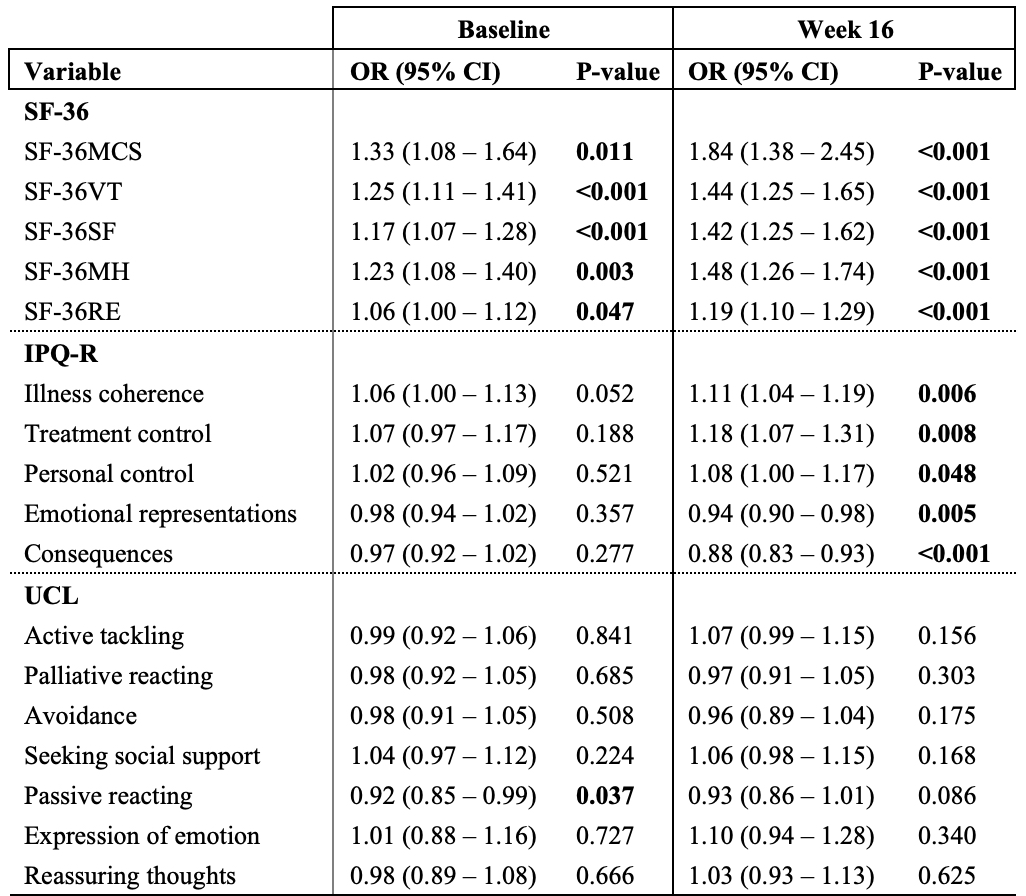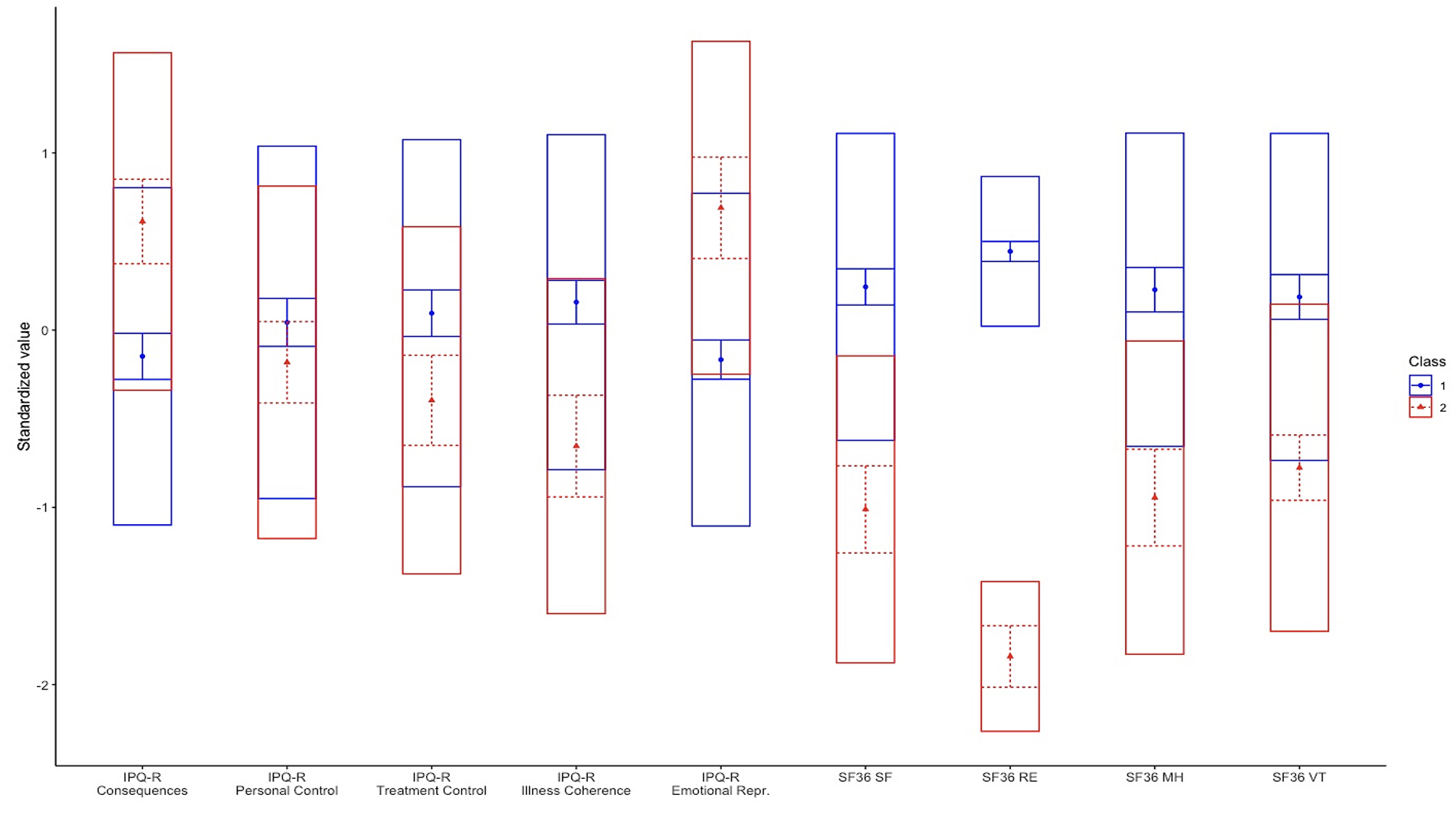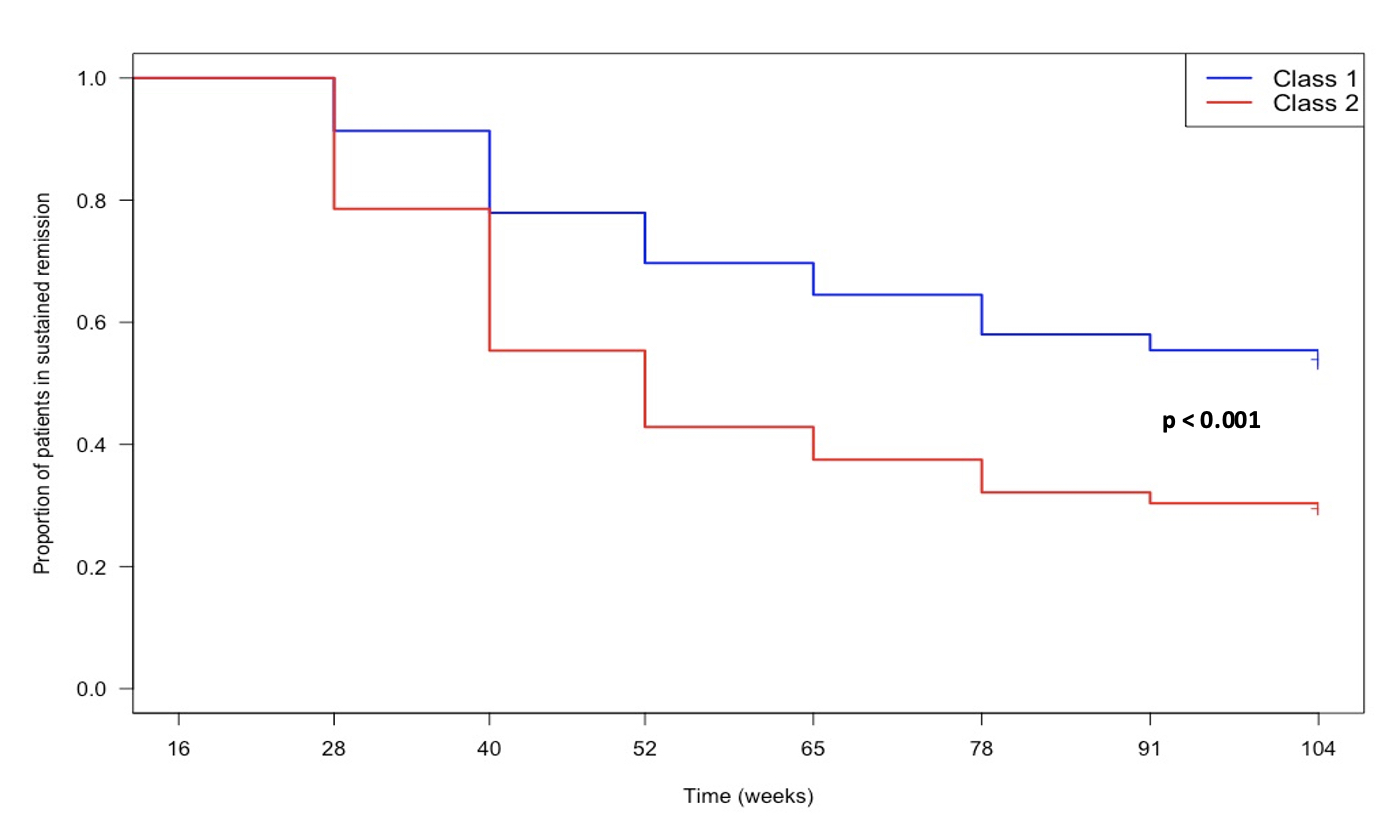Session Information
Date: Sunday, November 7, 2021
Title: RA – Diagnosis, Manifestations, & Outcomes Poster II: Miscellaneous Aspects of RA (0786–0812)
Session Type: Poster Session B
Session Time: 8:30AM-10:30AM
Background/Purpose: Patient-reported outcomes (PROs) relating to global psychosocial wellbeing are rarely assessed in clinical trials for rheumatoid arthritis (RA), and specifically not to tailor additional interventions. Moreover, many patients with RA report ongoing pain, fatigue and suboptimal mental health despite satisfactory clinical disease control. We aimed to describe the association of early psychosocial wellbeing, coping and illness perceptions with sustained remission in early RA, and to identify patients with psychosocial unmet needs despite being in clinical remission.
Methods: Data were analysed from the 2-year randomised controlled treat-to-target trial Care in early RA (CareRA). Patients completed the Short Form 36 (SF-36), Revised Illness Perception Questionnaire (IPQ-R) and Utrecht Coping List (UCL) among other PROs. Sustained remission was defined as continued DAS28-CRP < 2.6 from week 16 to week 104. SF-36 mental components, UCL and IPQ-R at baseline and week 16 were studied as predictors of sustained remission with multivariate logistic regression adjusting for age, gender, treatment arm, serology and 2-component DAS28 (1). Subgroups of patients in remission at week 16 were identified by Latent Profile Analysis (LPA) including significant psychosocial predictors from the regression models. Survival of remission was compared per subgroup by Kaplan-Meier analysis and Cox proportional hazards regression.
Results: All 379 included patients were recently diagnosed with RA and had not received DMARDs before study initiation. Most patients were women (69%) and RF/ACPA-positive (66%), with a mean age of 52 (SD 13) years. Sustained DAS28 CRP-remission was achieved by 124/379 (33%) patients. Sustained remission was associated with higher SF-36 scores and less passive coping at baseline, and with higher SF-36 scores and more positive IPQ-R reports at week 16 (Table 1). Among patients in DAS28-CRP remission at week 16 (n=287), two subgroups were identified: a low-psychosocial-burden (n=231) and a high-psychosocial-burden group (n=56) (Fig. 1). The low-psychosocial-burden group retained remission longer (HR 0.51 [0.35-0.73]) (Fig. 2).
Conclusion: Suboptimal psychosocial wellbeing and illness perceptions were associated with lower odds of sustained remission in an early RA trial. Illness perceptions appeared to be more clinically relevant after 4 months of treatment. One-in-five patients still showed worse psychosocial outcomes despite being in early clinical remission, and these patients tended to lose remission earlier. Future research should focus on timely identification of unmet needs and person-centred interventions to target them.
(1) Hensor EMA, et al. Validity of a two-component imaging-derived disease activity score for improved assessment of synovitis in early rheumatoid arthritis. Rheumatol (Oxford). 2019;58(8):1400–9
Results were obtained from multivariate logistic regression models with the specified variables as predictors and the odds of sustained DAS28-CRP-remission (from week 16 to week 104) as the dependent variable. All models contained age, gender, treatment arm, the presence of autoantibodies and 2C-DAS28 as covariates. OR = odds ratio, CI = confidence interval; SF_36 = Short Form 36, MCS = mental component score, VT = vitality, SF = social function, MH = mental health, RE = role emotional; IPQ-R = Revised Illness Perception Questionnaire; UCL = Utrecht Coping List; 2C-DAS28 = two-component Disease Activity Score in 28 joints
Results of latent profile analysis (LPA) of patients in DAS28-CRP remission at week 16, based on 9 psychosocial variables. Optimal model fit was obtained for 2 classes with equal variances and equal covariances. Class 1 consists of 231/287 patients (80%) and class 2 of 56/287 patients (20%). IPQ-R = Revised Illness Perception Questionnaire; SF36 = Short Form 36, VT = vitality, SF = social function, MH = mental health, RE = role emotional
To cite this abstract in AMA style:
Doumen M, De Cock D, Pazmino S, Bertrand D, Westhovens R, Verschueren P. Psychosocial Wellbeing and Illness Perceptions During the Early Disease Phase Predict Sustained Remission in Rheumatoid Arthritis [abstract]. Arthritis Rheumatol. 2021; 73 (suppl 9). https://acrabstracts.org/abstract/psychosocial-wellbeing-and-illness-perceptions-during-the-early-disease-phase-predict-sustained-remission-in-rheumatoid-arthritis/. Accessed .« Back to ACR Convergence 2021
ACR Meeting Abstracts - https://acrabstracts.org/abstract/psychosocial-wellbeing-and-illness-perceptions-during-the-early-disease-phase-predict-sustained-remission-in-rheumatoid-arthritis/



